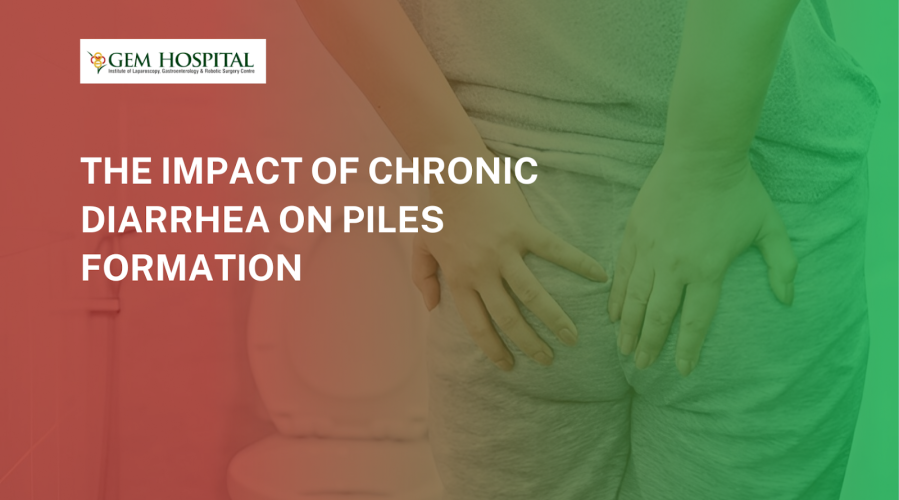Consult experienced hernia doctors in Chennai for expert surgical care. Advanced diagnosis, safe hernia surgery, and faster recovery with specialized treatment.
The Impact of Chronic Diarrhea on Piles Formation

Chronic diarrhea, characterized as lasting longer than four weeks, is a condition that may cause multiple gastrointestinal problems and subsequent effects. One gaseous effect that can stem from chronic diarrhea is a common condition called piles (hemorrhoids). Piles are congenitally swollen blood vessels that are found around in and around the anus and rectum. People who internally have conditions which lead to chronic diarrhea are at increased risk for piles due to the strain and frequency of bowel movements. This article will explain the reasons connected to chronic diarrhea and development of piles and give suggestions to mitigate the effects of both.
How Chronic Diarrhea can Contribute to Piles
Frequent loose stool increases pressure in the anal area which can exacerbate the irritation and inflammation of the blood vessels in the rectum. Increased pressure on anal blood vessels can lead to swelling causing the formation of piles. Additionally, people with chronic diarrhea often experience the urge to have a bowel movement frequently with the need to wipe after each bowel movement, aggravating the inflammation and irritation of the skin around the anus and increasing the chance of piles forming.
In addition to irritation caused by recurrent stool, the act of straining can lead to piles in the rectal region. Straining leads to increased pressure on the rectal veins due to the weight of the stool, leading to the walls of the vein stretching and weakening, leading them vulnerable to bulging and forming piles. Chronic diarrhea is often accompanied by watery stools that can irritate the sensitive skin around the anus leading to discomfort, itching and even anorectal bleeding in more severe cases.Chronic Diarrhea and Piles: An Overview
Individuals with chronic diarrhea are at a higher risk for developing both internal and external piles. Internal piles are inside the rectum and often do not hurt, but can bleed or be uncomfortable when having a bowel movement. External piles are outside of the anus, and can be very painful or itchy. Chronic diarrhea can make the pain of piles worse and can create other discomfort due to both conditions as well.
It should be noted that people with chronic diarrhea can also have bouts of constipation. When chronic diarrhea is combined with constipation, this is often referred to as "irritable bowel syndrome or "IBS." This is a potentially poor combination, or complication for people with these two conditions. The combination of diarrhea and constipation goes back and forth on the rectum, which increases the potential of the irritated rectum and the symptom of piles.
Treating Chronic Diarrhea and Preventing Piles
Treating chronic diarrhea and preventing piles has several levels including treating the symptoms of diarrhea and treating the risk of piles. Below are some steps that a person can do to treat themselves and prevent piles from developing:
- Dietary Change: High fiber diets prevent both diarrhea and constipation, with enough fiber causing the bulking of stool leading to better bowel movements. Foods high in fiber can be fruits, vegetables, and are ALL whole grains.Additionally, it's important to drink a lot of water throughout the day. This prevents dehydration, which can aggravate diarrhea and lead to constipation.
- Medication for Chronic Diarrhea: Loperamide (Imodium) is an example of an over-the-counter diarrhea medication that can reduce the number of episodes of diarrhea. It's always best to check with a doctor to see what options are best for treatment. Chronic diarrhea can sometimes be the symptom of an underlying condition such as IBS or IBD.
- Reduce Straining: Straining can exacerbate chronic diarrhea and hemorrhoids. To avoid straining, be sure not to sit on the toilet for long periods of time. Placing a stool or footrest under your knees to elevate them while sitting on the toilet can also help reduce strain and discomfort when having a bowel movement.
- Hygiene and Wiping: Again, with diarrhea, excessive wiping can result in irritation and inflammation of the anal areas. It's best to avoid dry toilet paper and to use soft and moist wipes when possible. Additionally, appropriate creams designed for hemorrhoids can also reduce discomfort.
- Activity and Lifestyle: Regular activity helps with good digestion and may help prevent constipation. Even gentle activity (like walking, swimming or yoga) can help to keep your bowel movements regular and potentially help prevent hemorrhoids.
- Use of Medical Professionals: In the course of struggling with chronic diarrhea and piles, medical intervention may be necessary for some cases. If you've made dietary changes or the use of over-the-counter medications is not a help, it may be time to see a medical professional. A medical provider may recommend additional tests (like a colonoscopy or stool testing) to identify the cause of chronic diarrhea. If piles are severe, medical treatments (like rubber band ligation, sclerotherapy or surgery) may also be necessary.
Chronic diarrhea can seriously affect your quality of life not only in terms of discomfort and pain but also the increased risk of developing piles. Again, there can be constant straining of the anal area and irritation/fragility with nearly constant bowel movements that can lead to engorged and swollen blood vessels, resulting in piles. Managing chronic diarrhea and piles will include dietary modification, medication, hygiene, and even lifestyle measures. Untreated chronic diarrhea and piles can lead to additional complications, worry, and generally more discomfort.
If you are experiencing chronic diarrhea or piles symptoms, please seek consulting with medical professionals for acute care and interventions. Gem Hospital provides complete care for gastrointestinal disorders, including chronic diarrhea and piles. Let us create a treatment plan that is unique to you and the troubles you're experiencing. Schedule your appointment today for gastrointestinal treatment needs to live a healthier life!
Blogs & Article
Get advanced liver transplant treatment in Chennai with expert surgeons, modern technology, and comprehensive care for safe and successful outcomes.
Get advanced piles treatment in Erode with expert doctors. Safe procedures, modern technology, and effective care for fast relief and recovery.


